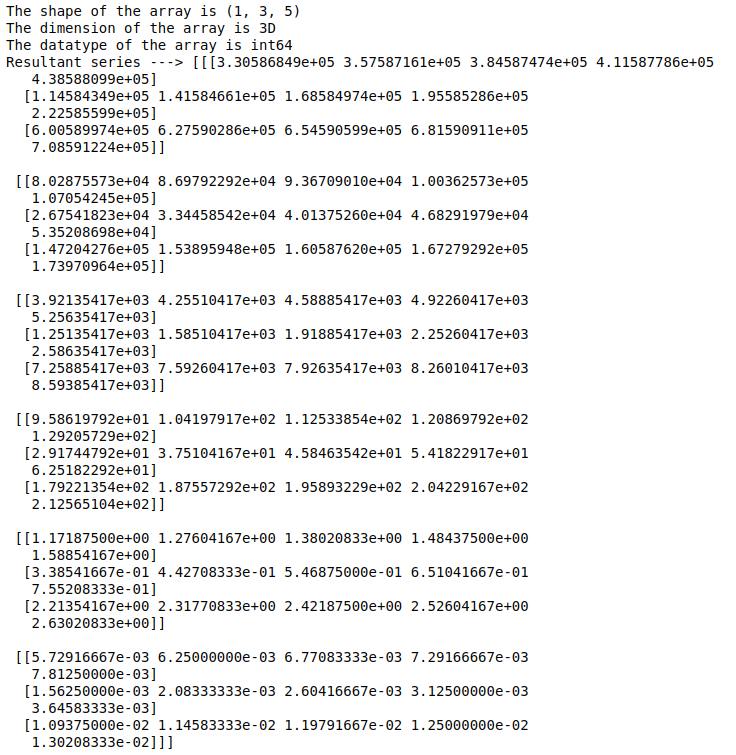Python程序对切比雪夫数列进行积分并设定积分的下限
切比雪夫数列具有最大可能的前导系数的多项式,其在区间[-1, 1]上的绝对值以1为界,它们也是 “极值 “多项式。切比雪夫多项式在逼近理论中意义重大,因为Tn(x)的根,也叫切比雪夫节点,被用作优化多项式内插的匹配点。所得的插值多项式使Runge现象的问题最小化,提供的近似值接近于最大规范下连续函数的最佳多项式近似值,也称为 “最小 “准则。
为了进行切比雪夫积分,NumPy提供了一个名为chebyshev.chebint的函数,可以用来积分切比雪夫级数。
语法: chebyshev.chebint(c, m=1, k=[], lbnd=0, scl=1, axis=0)
参数:
- c – 切比雪夫级数系数的阵列。
- m – (整数)积分的顺序,必须是正数
- k – 积分常数。第一个积分在零点的值是列表中的第一个值,第二个积分在零点的值是第二个值,等等。
- lbnd – 积分的下限。(默认:0)
- scl – 每次积分后,在加入积分常数之前,结果要乘以scl。(默认:1)
- axis – 积分所涉及的轴。
示例 1:
在第一个例子中,让我们考虑一个一维数组的一阶积分,1作为积分常数,2作为区间的下限。如图所示,导入必要的包,并传递适当的参数,如下图所示。
import numpy as np
from numpy.polynomial import chebyshev
# co.efficient array
c = np.array([3, 5, 7, 9])
print(f'The shape of the array is {c.shape}')
print(f'The dimension of the array is {c.ndim}D')
print(f'The datatype of the array is {c.dtype}')
res = chebyshev.chebint(c, m=1, k=1, lbnd=-2)
# integrated chebyshev series with lower bound of -2
print(f'Resultant series ---> {res}')
输出:

示例 2:
在第二个例子中,让我们考虑一个三阶积分的二维数组,3作为积分常数,-10作为区间的下限。如图所示,导入必要的包,并传递适当的参数,如下图所示。
import numpy as np
from numpy.polynomial import chebyshev
# co.efficient array
c = np.array([[3, 5, 7, 9], [21, 22, 23, 24]])
print(f'The shape of the array is {c.shape}')
print(f'The dimension of the array is {c.ndim}D')
print(f'The datatype of the array is {c.dtype}')
res = chebyshev.chebint(c, m=3, k=3, lbnd=-10)
# integrated chebyshev series with lower bound of -10
print(f'Resultant series ---> {res}'
输出:

示例 3:
在第三个例子中,让我们考虑一个五阶积分的三维阵列,5作为积分常数,-20作为区间的下限。如图所示,导入必要的软件包,并传递适当的参数,如下所示。
import numpy as np
from numpy.polynomial import chebyshev
# co.efficient array
c = np.array([[[11, 12, 13, 14, 15],
[3, 4, 5, 6, 7],
[21, 22, 23, 24, 25]]])
print(f'The shape of the array is {c.shape}')
print(f'The dimension of the array is {c.ndim}D')
print(f'The datatype of the array is {c.dtype}')
res = chebyshev.chebint(c, m=5, k=5, lbnd=-20)
# integrated chebyshev series with lower bound of -20
print(f'Resultant series ---> {res}')
输出:

 极客教程
极客教程